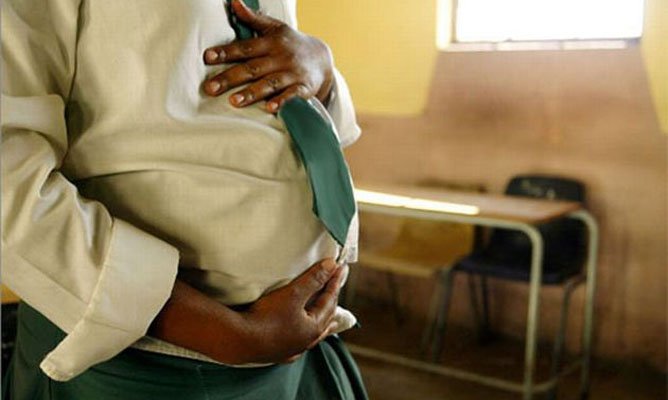Parent-child communication key in reducing adolescent pregnancies

By Buhle Nkomo
Nomalanga Ncube is a 34-year-old widow from Lumene Village in Gwanda. She is the mother of a daughter who fell pregnant at 15 years in 2018.
Ncube said she regrets her failure to be involved in her daughter’s sexual development as this brought more pain and challenges to them.
“I feel like I failed my daughter. Having a child as a teenager destroyed her future. She dropped out of school and we have been struggling to raise the child as the man responsible had impregnated two other girls from the village and escaped to South Africa,” said Ncube
Ncube said it was hard to engage her daughter on sexual health issues as culturally, the task is performed by aunts and grandmothers.
“I thought she received sex education from her grandmother and aunts but I discovered that she was clueless which is why it is important as a parent to actively engage your daughter on sex education.” Ncube said.
Ncube’s struggle resonates with many women who still find it difficult to talk about Sexual Reproductive Health Rights due to cultural and traditional limitations.
In light of these struggles, a parent from Emhlangeni suburb, Ntombizakhe Moyo said she established a parenting support network last year with the aim of assisting mothers in their parenting roles to increase parent-child communication.
“We emphasise dialogue with children instead of beating them because conflicts are always present but use of violence in curbing them is a choice,” said Moyo
“The network is still growing with occasional visits from spouses but it has helped us realise that our pleas, fears and needs are the same so that when we share experiences we comfort each other as we realise that our children are exhibiting normal behaviour.” she said
According to the 2019 United Nations Population Fund (UNFPA) State of the World Population report, fertility rates remained high among young girls from 15-19 years, with nearly 1 in 10 adolescent girls giving birth every year while many die or get injured during child birth.
“Approximately 12 million girls aged 15- 19 years and at least 777,000 girls under 15 years give birth each year in developing regions. At least 10 million unintended pregnancies occur each year among adolescent girls aged 15-19 years in developing world,” says the World Health Organisation (WHO) in its 2020 report, “Adolescent pregnancy”.
“Adolescent pregnancies are a global problem occurring in high-, middle- and low-income countries. Around the world, however, adolescent pregnancies are more likely to occur in marginalised communities, commonly driven by poverty and lack of education and employment opportunities.”
In 2018, the United Nations Educational Scientific and Cultural Organisation (UNESCO) revealed that over 6 000 teenage girls left school due to unintended pregnancies.
Last year, the National Aids Council (NAC) reported that almost 200 pupils had dropped out of school within three months in Bulawayo due to child marriage, pregnancies and financial challenges.
More recently, seven under-age pregnant girls were forced to drop out of school in Shurugwi Secondary School. Some of the girls were forced into early marriages with artisanal miners. The report stated that there could be gaps in the sexual and reproductive health issues in rural and resettlement schools.
Abigirl Masuku, a teenager from Luveve said young girls fear approaching or opening up to elders on sexuality issues because of the stigma attached to an adolescent seeking sexual reproductive health information.
“Some parents and guidance and counselling teachers are not teenager friendly so that we end up advising each other as peers because of the fear of being perceived as immoral.” She said.
Commenting on the rise of teenage pregnancies in Zimbabwe, Gender Links Country Manager Priscilla Maposa said harsh economic conditions and the decadence of family values have been main contributing factors to teenage pregnancies.
“Because of the harsh economic environment, teenagers are not spared and therefore, in search for economic survival they end up indulging in sex and getting pregnant. The role of auntshas been eroded and at times teenagers lack guidance,” Said Maposa
Maposa also added that Sexual reproductive health should be embedded in the school curriculum from early stages to curb teenage pregnancy in Zimbabwe.
A parent from Bubi District who agreed to speak only on condition of anonymity said being a voluntary mentor affiliated with a local non-profit organisation fighting against child marriages has helped her understand that some pregnant teenage girls end up being married off due to the economic crisis faced by many households especially in rural areas.
“As you know the district has lots of artisanal miners who are perceived to be richer with United Stated Dollars so when a child gets pregnant, the parents marry them off to benefit from that arrangement through receiving lobola or payment for damages” she said.
Tafadzwa Ngosi, Educational Therapist and Mentor at Inspire Tutors, a Harare based non-profit currently running a sisterhood mentorship program in secondary schools said limited knowledge on sexuality education increases the risk of pregnancy among young girls.
“Information is a powerful tool yet a lot of young girls do not know much about their bodies, contraceptives making them vulnerable to sex predators and pregnancies. Surprisingly we still have parents who withhold sexuality information from their children because of shame and the belief that it is the duty of aunties.” Ngosi said
Ngosi explained the importance for parents to participate in their children’s sexual rights and choices.
“Adolescents now have access to technology and if parents are not talking about sex, pregnancy, dating and puberty with their children, they can easily go astray with Google. Removing shame from the subject and teaching it with love will make a difference. The conversation should be out and open not something to shy away from. If parents and adolescents engage in such conversations, they build trust causing adolescents to question other sources based on what their trusted source (parents) could have said,” She said
“We should start conversations that allow young girls to ask questions in a safe space, to learn to love their bodies enough to protect them and to want more from life.” Ngosi added.
She mentioned that religion and cultural barriers are also contributing to the increase of adolescent pregnancies.
“Some girls belong to religious sects that encourage early childhood marriages which result in child marriages. Some are used in cultural practises such as ‘kuripiswa’ which basically means being used as a symbol of atonement in situations where a man has been widowed and there is need for a wife replacement in that home” said Ngosi
She also recommended that Civil Society Organisations deliver more Sexual Reproductive Health oriented programs targeting adolescents to prevent early unintended pregnancies and child marriages.
“CSOs should focus on programming that emphasises sexual reproductive health issues to protect adolescents from risks of pregnancy, infections and early child marriages.” She said






